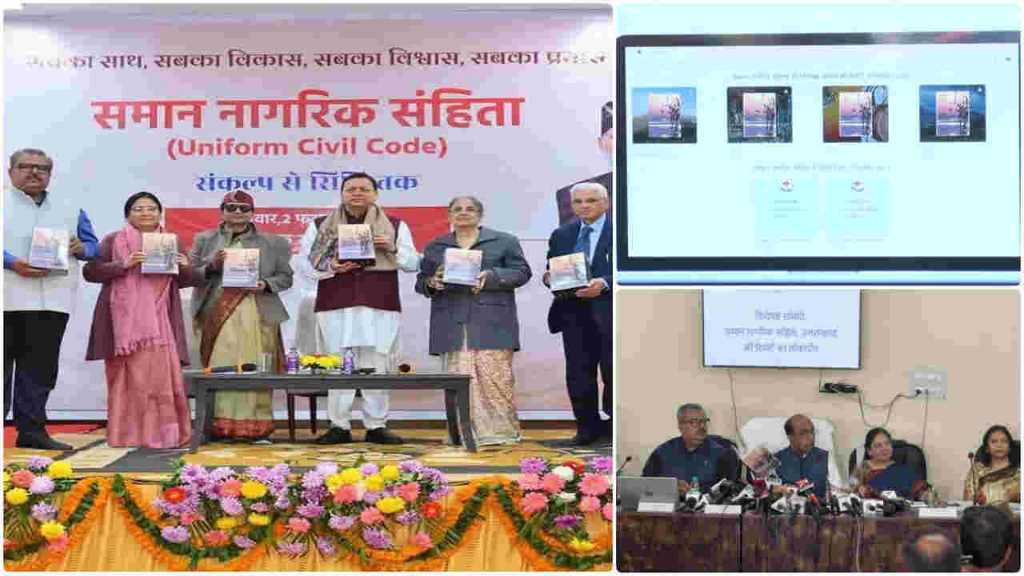Uttarakhand: The Rule Making Committee of Uniform Civil Code made the UCC report public, know the specialty of the 4-part report

The Rules Making and Implementation Committee of the Uniform Civil Code has made the UCC report public today on Friday 12 July 2024. Its purpose is that the people of the state can read and understand the UCC report before the implementation of the Uniform Civil Code in the state. The UCC report has been prepared in four volumes.
UCC report made public
The Uniform Civil Code, Uttarakhand, 2024 has a total of 392 articles. After receiving the UCC report by the state government, it was passed by the Assembly on 07 February along with the approval of the Cabinet. To implement the UCC report in a proper manner, there was a need to prepare rules related to it. In view of this, the Dhami government of Uttarakhand constituted a seven-member Rules Making and Implementation Committee under the chairmanship of former CS Shatrughan Singh of Uttarakhand on 10 February 2024.
The journey was like this
Along with the formation of the Rules Making and Implementation Committee to prepare the rules of UCC, the government had sent the UCC to Rashtrapati Bhavan for approval from the President. After getting the approval of the President on March 11, 2024, the state government also issued the gazette notification of UCC on March 12, 2024. Along with this, the Rules Making and Implementation Committee is preparing the rules to implement the UCC, which is almost ready.
UCC report is in four sections
The UCC report has been prepared in four sections. The first section is based on the Report of the Expert Committee, the second section is Draft Code, the third section is Report on Stakeholder Consultation and the fourth section is Draft Code. At the same time, Shatrughan Singh, Chairman of the Rules Making and Implementation Committee, said in the press conference that after the report was prepared, the report could not be shared with the public as the Model Code of Conduct had come into force. Due to which the UCC report has been made public today on Friday. In such a situation, the public can read all the four sections of the UCC by visiting the UCC website.
This is the UCC website
A five-member expert committee was formed under the chairmanship of retired judge Ranjana Desai to prepare the draft of the UCC. In such a situation, after the UCC report was submitted to the state government by the expert committee, people were querying for the report. Also, they were asking for the report through RTI. In view of which, the committee preparing the rules of the UCC had decided to make the report public. In such a situation, the committee has made the report of the Uniform Civil Code public. Therefore, the general public can read the UCC report by visiting the UCC website https://ucc.uk.gov.in/.
Main provisions in UCC-
With the implementation of the Uniform Civil Code, social evils and bad practices like child marriage, polygamy, divorce will be curbed in the society. The culture, beliefs and customs of any religion will not be affected by this law.
UCC will protect child and women rights
- Registration of marriage will be compulsory. If registration is not done, government facilities will not be available.
- Second marriage while husband and wife are alive will be prohibited.
- In all religions, the minimum age of marriage is 21 years for boys and 18 years for girls.
- If one person in a married couple changes his/her religion without the consent of the other person, then the other person will have the right to divorce that person and take maintenance allowance.
- At the time of divorce or domestic dispute between husband and wife, the custody of a child up to 5 years will remain with the child’s mother.
- In all religions, husband and wife will have equal right to divorce.
- Son and daughter will have equal property rights in all religions and communities for all classes.
- The practice of Halala and Iddat prevalent in the Muslim community will be banned.
- There will be no difference between legitimate and illegitimate children for property rights.
- Illegitimate children will also be considered biological children of that couple.
- After the death of a person, his wife and children will have equal rights in his property.
- The rights of a child growing in the womb of a woman will be protected.
- Registration will be mandatory for live-in relationships.
- Children born during live-in will be considered the legitimate children of that couple. That child will have all the rights like a biological child.






